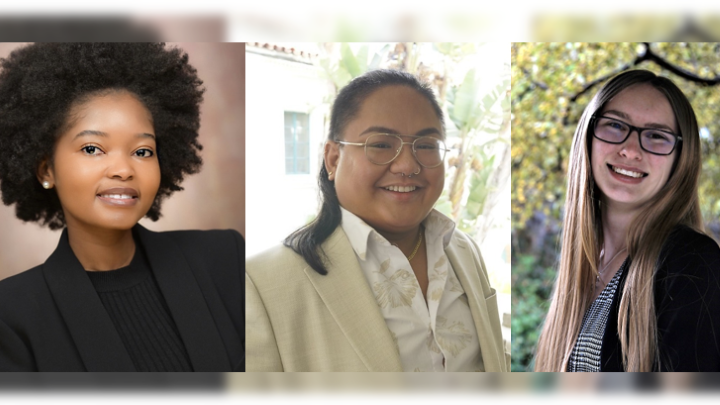JDP Students Awarded Presidential Graduate Research Fellowship

The Presidential Graduate Research Fellowship (PGRF) is an award for nonresident students through the College of Graduate Studies. This award is intended to support graduate students who display outstanding potential for achievement in their field but are not yet considered California residents for tuition purposes. Students are provided with a waiver for the course charges required of non-resident students. This year’s four SPH awardees’ work spans a variety of projects, both US-based and globally. Three incoming students in the SDSU/UCSD Joint Doctoral Program (JDP) are profiled below.
Andile Mkhonta, a first year JDP student in Global Health, works in the Fielding-Miller Lab at UCSD. Her primary project will report the findings of the Food Insecurity Experience Scale (FIES) from her home country Eswatini (formerly known as Swaziland). “The goal of this paper is to spark a discussion about the social aspect of food insecurity [as well as] nutrition and health disparities in the US and Eswatini,” Andile explained, “[because] the consequences of food insecurity go beyond just access to food.” Andile hopes to apply the skills she will hone in this program to translational research in the future within the project Nutrition for Precision Health, powered by the All of US Research Program. “[I am] overjoyed to have been selected for the presidential scholarship,” Andile said. “The JDP program holds the keys to applying myself and fitting in spaces where I would otherwise not be able to without a quality education.”
Andy Lim, a first year JDP student in Public Health focusing in the Health Behavior Track, works with the Action Research on Community Health Equity and Stigma (ARCHES) Lab. Their primary project under Dr. Jerel Calzo aims to identify elements that can be leveraged for use in a flexible just-in-time adaptive intervention that will be able to adjust in lockstep with the rapidly transforming needs of LGBTQIA+ youth to help them reduce their tobacco and nicotine use. “Right now, we are implementing a pilot [study] using ecological momentary assessment,” Andy explained. This assessment will help the ARCHES Lab regularly gather real-time data on the adolescents’ evolving behaviors in a way that seeks to minimize recall bias while simultaneously gauging their acceptability of the potential intervention in a way that meets their needs appropriately and evaluating the feasibility of the intervention. Andy is excited to actualize their goal of pursuing their doctoral degree with support from both the PGRF and University Research Fellowship (UGF), and to build on their experiences on the University of Florida’s Health Psychology Research Team during their undergraduate studies and with the University of South Florida’s Ybor Youth Clinic in supporting underserved adolescents that began during their master’s studies. “I hope to be able to continue my work and to make a positive impact on the communities I work with.”
Hannah Barca, a first year JDP student in Public Health concentrating in Epidemiology, currently works with the US Department of Defense HIV/AIDS Prevention Program (DHAPP) as a data analyst. Her role is to aid in collecting, managing, and analyzing data on HIV and other STI prevalence from members of foreign militaries in Africa and South America with whom the Department of Defense (DoD) collaborates. The project, which uses the Seroprevalence and Behavioral Epidemiology Risk Surveys (SABERS), also provides free treatment services for individuals who test positive on any of these screenings. During school breaks, Hannah will also help train foreign military personnel to improve data reliability throughout the collection process. “[People] are more likely to tell the truth on a survey that’s being administered by someone they know rather than some civilian US female,” Hannah explained, “especially since it’s about sensitive topics.” Although Hannah’s primary research interest is psychiatric epidemiology specifically focusing on LGBTQ+ adolescents, she is excited to partner with DoD in this effort. “[With this project,] there’s opportunity to help with stigma and help with education and prevention as well. And [prevention] – that’s where my heart lies.” As an out-of-state student, Hannah expressed deep gratitude for the PGRF’s funding. “[Rather than worrying about financial stressors], this will let me more easily attain my career goals of being an epidemiology professor and researcher by letting me focus more on my academic work.”

